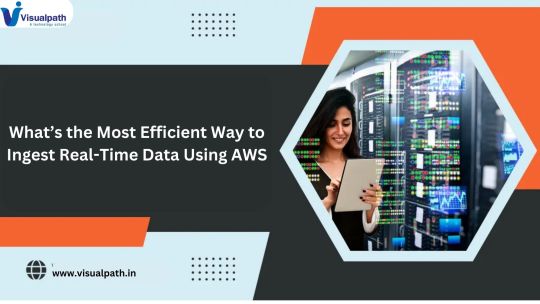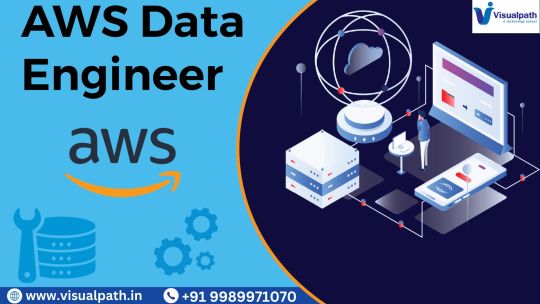#data engineering online training
Explore tagged Tumblr posts
Text
Who provides the best Informatica MDM training?
1. Introduction to Informatica MDM Training
Informatica MDM (Master Data Management) is a crucial aspect of data management for organizations dealing with large volumes of data. With the increasing demand for professionals skilled in Informatica MDM, the need for quality training has become paramount. Choosing the right training provider can significantly impact your learning experience and career prospects in this field.

2. Importance of Choosing the Right Training Provider
Selecting the best Informatica MDM training provider is essential for acquiring comprehensive knowledge, practical skills, and industry recognition. A reputable training provider ensures that you receive the necessary guidance and support to excel in your career.
3. Factors to Consider When Choosing Informatica MDM Training
Reputation and Experience
A reputable training provider should have a proven track record of delivering high-quality training and producing successful professionals in the field of Informatica MDM.
Course Curriculum
The course curriculum should cover all essential aspects of Informatica MDM, including data modeling, data integration, data governance, and data quality management.
Training Methodology
The training methodology should be interactive, engaging, and hands-on, allowing participants to gain practical experience through real-world scenarios and case studies.
Instructor Expertise
Experienced and certified instructors with extensive knowledge of Informatica MDM ensure effective learning and provide valuable insights into industry best practices.
Flexibility of Learning Options
Choose a training provider that offers flexible learning options such as online courses, instructor-led classes, self-paced learning modules, and blended learning approaches to accommodate your schedule and learning preferences.
4. Comparison of Training Providers
When comparing Informatica MDM training providers, consider factors such as cost, course duration, support services, and reviews from past participants. Choose a provider that offers the best value for your investment and aligns with your learning objectives and career goals.
5. Conclusion
Selecting the right Informatica MDM training provider is crucial for acquiring the necessary skills and knowledge to succeed in this competitive field. Evaluate different providers based on factors such as reputation, course curriculum, instructor expertise, and flexibility of learning options to make an informed decision.
Contact us 👇
📞Call Now: +91-9821931210 📧E Mail: [email protected] 🌐Visit Website: https://inventmodel.com/course/informatica-mdm-online-live-training
#informatica#software engineering#MDM Training#Informatica MDM Training#Data Management courses#MDM online course#online informatica training
3 notes
·
View notes
Text
Real-time Data Processing with Azure Stream Analytics
Introduction
The current fast-paced digital revolution demands organizations to handle occurrences in real-time. The processing of real-time data enables organizations to detect malicious financial activities and supervise sensor measurements and webpage user activities which enables quicker and more intelligent business choices.
Microsoft’s real-time analytics service Azure Stream Analytics operates specifically to analyze streaming data at high speed. The introduction explains Azure Stream Analytics system architecture together with its key features and shows how users can construct effortless real-time data pipelines.
What is Azure Stream Analytics?
Algorithmic real-time data-streaming functions exist as a complete serverless automation through Azure Stream Analytics. The system allows organizations to consume data from different platforms which they process and present visual data through straightforward SQL query protocols.
An Azure data service connector enables ASA to function as an intermediary which processes and connects streaming data to emerging dashboards as well as alarms and storage destinations. ASA facilitates processing speed and immediate response times to handle millions of IoT device messages as well as application transaction monitoring.
Core Components of Azure Stream Analytics
A Stream Analytics job typically involves three major components:
1. Input
Data can be ingested from one or more sources including:
Azure Event Hubs – for telemetry and event stream data
Azure IoT Hub – for IoT-based data ingestion
Azure Blob Storage – for batch or historical data
2. Query
The core of ASA is its SQL-like query engine. You can use the language to:
Filter, join, and aggregate streaming data
Apply time-window functions
Detect patterns or anomalies in motion
3. Output
The processed data can be routed to:
Azure SQL Database
Power BI (real-time dashboards)
Azure Data Lake Storage
Azure Cosmos DB
Blob Storage, and more
Example Use Case
Suppose an IoT system sends temperature readings from multiple devices every second. You can use ASA to calculate the average temperature per device every five minutes:

This simple query delivers aggregated metrics in real time, which can then be displayed on a dashboard or sent to a database for further analysis.
Key Features
Azure Stream Analytics offers several benefits:
Serverless architecture: No infrastructure to manage; Azure handles scaling and availability.
Real-time processing: Supports sub-second latency for streaming data.
Easy integration: Works seamlessly with other Azure services like Event Hubs, SQL Database, and Power BI.
SQL-like query language: Low learning curve for analysts and developers.
Built-in windowing functions: Supports tumbling, hopping, and sliding windows for time-based aggregations.
Custom functions: Extend queries with JavaScript or C# user-defined functions (UDFs).
Scalability and resilience: Can handle high-throughput streams and recovers automatically from failures.
Common Use Cases
Azure Stream Analytics supports real-time data solutions across multiple industries:
Retail: Track customer interactions in real time to deliver dynamic offers.
Finance: Detect anomalies in transactions for fraud prevention.
Manufacturing: Monitor sensor data for predictive maintenance.
Transportation: Analyze traffic patterns to optimize routing.
Healthcare: Monitor patient vitals and trigger alerts for abnormal readings.
Power BI Integration
The most effective connection between ASA and Power BI serves as a fundamental feature. Asustream Analytics lets users automatically send data which Power BI dashboards update in fast real-time. Operations teams with managers and analysts can maintain ongoing key metric observation through ASA since it allows immediate threshold breaches to trigger immediate action.
Best Practices
To get the most out of Azure Stream Analytics:
Use partitioned input sources like Event Hubs for better throughput.
Keep queries efficient by limiting complex joins and filtering early.
Avoid UDFs unless necessary; they can increase latency.
Use reference data for enriching live streams with static datasets.
Monitor job metrics using Azure Monitor and set alerts for failures or delays.
Prefer direct output integration over intermediate storage where possible to reduce delays.
Getting Started
Setting up a simple ASA job is easy:
Create a Stream Analytics job in the Azure portal.
Add inputs from Event Hub, IoT Hub, or Blob Storage.
Write your SQL-like query for transformation or aggregation.
Define your output—whether it’s Power BI, a database, or storage.
Start the job and monitor it from the portal.
Conclusion
Organizations at all scales use Azure Stream Analytics to gain processing power for real-time data at levels suitable for business operations. Azure Stream Analytics maintains its prime system development role due to its seamless integration of Azure services together with SQL-based declarative statements and its serverless architecture.
Stream Analytics as a part of Azure provides organizations the power to process ongoing data and perform real-time actions to increase operational intelligence which leads to enhanced customer satisfaction and improved market positioning.
#azure data engineer course#azure data engineer course online#azure data engineer online course#azure data engineer online training#azure data engineer training#azure data engineer training online#azure data engineering course#azure data engineering online training#best azure data engineer course#best azure data engineer training#best azure data engineering courses online#learn azure data engineering#microsoft azure data engineer training
0 notes
Text
GCP Data Engineer - AccentFuture
Unlock the potential of data engineering with our comprehensive GCP Data Engineer Training. This program dives deep into the core responsibilities of data engineers, including building production-ready pipelines, managing data access, and ensuring governance. Gain hands-on experience with powerful GCP tools like BigQuery, Cloud Dataflow, and Cloud Composer, exploring topics such as data lakes, warehouses.
0 notes
Text
Snowflake Training - Best Snowflake Online Training Course

Enroll in our Snowflake Training to master cloud data warehousing. Our expert-led Snowflake Online Training covers real-time projects, hands-on labs, and Snowflake Data Engineering Certification prep. Learn Snowflake from industry pros and boost your career today!
#snowflake training#snowflake online training#snowflake course#learn snowflake#snowflake learning#snowflake data engineering certification#snowflake train
0 notes
Text
Azure Data Engineer Course In Bangalore | Azure Data
PolyBase in Azure SQL Data Warehouse: A Comprehensive Guide
Introduction to PolyBase
PolyBase is a technology in Microsoft SQL Server and Azure Synapse Analytics (formerly Azure SQL Data Warehouse) that enables querying data stored in external sources using T-SQL. It eliminates the need for complex ETL processes by allowing seamless data integration between relational databases and big data sources such as Hadoop, Azure Blob Storage, and external databases.
PolyBase is particularly useful in Azure SQL Data Warehouse as it enables high-performance data virtualization, allowing users to query and import large datasets efficiently without moving data manually. This makes it an essential tool for organizations dealing with vast amounts of structured and unstructured data. Microsoft Azure Data Engineer

How PolyBase Works
PolyBase operates by creating external tables that act as a bridge between Azure SQL Data Warehouse and external storage. When a query is executed on an external table, PolyBase translates it into the necessary format and fetches the required data in real-time, significantly reducing data movement and enhancing query performance.
The key components of PolyBase include:
External Data Sources – Define the external system, such as Azure Blob Storage or another database.
File Format Objects – Specify the format of external data, such as CSV, Parquet, or ORC.
External Tables – Act as an interface between Azure SQL Data Warehouse and external data sources.
Data Movement Service (DMS) – Responsible for efficient data transfer during query execution. Azure Data Engineer Course
Benefits of PolyBase in Azure SQL Data Warehouse
Seamless Integration with Big Data – PolyBase enables querying data stored in Hadoop, Azure Data Lake, and Blob Storage without additional transformation.
High-Performance Data Loading – It supports parallel data ingestion, making it faster than traditional ETL pipelines.
Cost Efficiency – By reducing data movement, PolyBase minimizes the need for additional storage and processing costs.
Simplified Data Architecture – Users can analyze external data alongside structured warehouse data using a single SQL query.
Enhanced Analytics – Supports machine learning and AI-driven analytics by integrating with external data sources for a holistic view.
Using PolyBase in Azure SQL Data Warehouse
To use PolyBase effectively, follow these key steps:
Enable PolyBase – Ensure that PolyBase is activated in Azure SQL Data Warehouse, which is typically enabled by default in Azure Synapse Analytics.
Define an External Data Source – Specify the connection details for the external system, such as Azure Blob Storage or another database.
Specify the File Format – Define the format of the external data, such as CSV or Parquet, to ensure compatibility.
Create an External Table – Establish a connection between Azure SQL Data Warehouse and the external data source by defining an external table.
Query the External Table – Data can be queried seamlessly without requiring complex ETL processes once the external table is set up. Azure Data Engineer Training
Common Use Cases of PolyBase
Data Lake Integration: Enables organizations to query raw data stored in Azure Data Lake without additional data transformation.
Hybrid Data Solutions: Facilitates seamless data integration between on-premises and cloud-based storage systems.
ETL Offloading: Reduces reliance on traditional ETL tools by allowing direct data loading into Azure SQL Data Warehouse.
IoT Data Processing: Helps analyze large volumes of sensor-generated data stored in cloud storage.
Limitations of PolyBase
Despite its advantages, PolyBase has some limitations:
It does not support direct updates or deletions on external tables.
Certain data formats, such as JSON, require additional handling.
Performance may depend on network speed and the capabilities of the external data source. Azure Data Engineering Certification
Conclusion
PolyBase is a powerful Azure SQL Data Warehouse feature that simplifies data integration, reduces data movement, and enhances query performance. By enabling direct querying of external data sources, PolyBase helps organizations optimize their big data analytics workflows without costly and complex ETL processes. For businesses leveraging Azure Synapse Analytics, mastering PolyBase can lead to better data-driven decision-making and operational efficiency.
Implementing PolyBase effectively requires understanding its components, best practices, and limitations, making it a valuable tool for modern cloud-based data engineering and analytics solutions.
For More Information about Azure Data Engineer Online Training
Contact Call/WhatsApp: +91 7032290546
Visit: https://www.visualpath.in/online-azure-data-engineer-course.html
#Azure Data Engineer Course#Azure Data Engineering Certification#Azure Data Engineer Training In Hyderabad#Azure Data Engineer Training#Azure Data Engineer Training Online#Azure Data Engineer Course Online#Azure Data Engineer Online Training#Microsoft Azure Data Engineer#Azure Data Engineer Course In Bangalore#Azure Data Engineer Course In Chennai#Azure Data Engineer Training In Bangalore#Azure Data Engineer Course In Ameerpet
0 notes
Text
Azure Data Engineering Training in Hyderabad
Master Azure Data Engineering with RS Trainings in Hyderabad
In today’s data-driven world, Azure Data Engineering plays a crucial role in managing, transforming, and analyzing massive datasets. With the increasing adoption of cloud technologies, Microsoft Azure has emerged as a leading platform for businesses to build scalable and reliable data solutions.

Why Learn Azure Data Engineering?
Azure Data Engineering is essential for professionals who want to: ✔️ Build and manage ETL pipelines using Azure services. ✔️ Work with Azure Data Factory, Azure Databricks, and Azure Synapse Analytics. ✔️ Implement data lakes, data warehouses, and real-time analytics. ✔️ Handle Big Data processing with Apache Spark. ✔️ Ensure data security, governance, and monitoring in cloud environments.
RS Trainings – The Best Place for Azure Data Engineering Training in Hyderabad
RS Trainings is recognized as the best training institute for Azure Data Engineering in Hyderabad. Our expert trainers, who work in top MNCs, provide hands-on training with real-world projects and practical examples to help learners gain in-depth knowledge.
Why Choose RS Trainings?
✅ Industry Expert Trainers – Learn from professionals with years of experience in Data Engineering and Azure. ✅ Comprehensive Curriculum – Covers Azure Data Factory, Databricks, Synapse, ADLS, Power BI, and more. ✅ Hands-on Training – Real-time projects and case studies to make you industry-ready. ✅ Flexible Learning Options – Right now Online live training only available. ✅ Placement Assistance – Guidance on resume building, interview preparation, and job support.
Who Can Join Azure Data Engineering Training?
Our course is perfect for: 🔹 Aspiring Data Engineers who want to start a career in cloud-based data solutions. 🔹 Software Developers looking to transition into data engineering roles. 🔹 Data Analysts & BI Professionals aiming to enhance their skills in Azure analytics. 🔹 IT Professionals who want to upgrade their skills in cloud-based data management.
Start Your Azure Data Engineering Journey Today!
If you're looking for the best Azure Data Engineering training in Hyderabad, RS Trainings is your ideal destination. Enroll today and take the next step toward a successful career in Azure Data Engineering.
📞 Contact RS Trainings to know more about course details, schedules, and enrollment!
#data engineering training in hyderabad#online azure data engineering#azure data engineering course#data engineering training institute in hyderabad#azure training center#azure data engineering training in hyderabad#azure data engineering online course#azure training institute in hyderabad
0 notes
Text
Introduction to AWS Data Engineering: Key Services and Use Cases
Introduction
Business operations today generate huge datasets which need significant amounts of processing during each operation. Data handling efficiency is essential for organization decision making and expansion initiatives. Through its cloud solutions known as Amazon Web Services (AWS) organizations gain multiple data-handling platforms which construct protected and scalable data pipelines at affordable rates. AWS data engineering solutions enable organizations to both acquire and store data and perform analytical tasks and machine learning operations. A suite of services allows business implementation of operational workflows while organizations reduce costs and boost operational efficiency and maintain both security measures and regulatory compliance. The article presents basic details about AWS data engineering solutions through their practical applications and actual business scenarios.
What is AWS Data Engineering?
AWS data engineering involves designing, building, and maintaining data pipelines using AWS services. It includes:
Data Ingestion: Collecting data from sources such as IoT devices, databases, and logs.
Data Storage: Storing structured and unstructured data in a scalable, cost-effective manner.
Data Processing: Transforming and preparing data for analysis.
Data Analytics: Gaining insights from processed data through reporting and visualization tools.
Machine Learning: Using AI-driven models to generate predictions and automate decision-making.
With AWS, organizations can streamline these processes, ensuring high availability, scalability, and flexibility in managing large datasets.
Key AWS Data Engineering Services
AWS provides a comprehensive range of services tailored to different aspects of data engineering.
Amazon S3 (Simple Storage Service) – Data Storage
Amazon S3 is a scalable object storage service that allows organizations to store structured and unstructured data. It is highly durable, offers lifecycle management features, and integrates seamlessly with AWS analytics and machine learning services.
Supports unlimited storage capacity for structured and unstructured data.
Allows lifecycle policies for cost optimization through tiered storage.
Provides strong integration with analytics and big data processing tools.
Use Case: Companies use Amazon S3 to store raw log files, multimedia content, and IoT data before processing.
AWS Glue – Data ETL (Extract, Transform, Load)
AWS Glue is a fully managed ETL service that simplifies data preparation and movement across different storage solutions. It enables users to clean, catalog, and transform data automatically.
Supports automatic schema discovery and metadata management.
Offers a serverless environment for running ETL jobs.
Uses Python and Spark-based transformations for scalable data processing.
Use Case: AWS Glue is widely used to transform raw data before loading it into data warehouses like Amazon Redshift.
Amazon Redshift – Data Warehousing and Analytics
Amazon Redshift is a cloud data warehouse optimized for large-scale data analysis. It enables organizations to perform complex queries on structured datasets quickly.
Uses columnar storage for high-performance querying.
Supports Massively Parallel Processing (MPP) for handling big data workloads.
It integrates with business intelligence tools like Amazon QuickSight.
Use Case: E-commerce companies use Amazon Redshift for customer behavior analysis and sales trend forecasting.
Amazon Kinesis – Real-Time Data Streaming
Amazon Kinesis allows organizations to ingest, process, and analyze streaming data in real-time. It is useful for applications that require continuous monitoring and real-time decision-making.
Supports high-throughput data ingestion from logs, clickstreams, and IoT devices.
Works with AWS Lambda, Amazon Redshift, and Amazon Elasticsearch for analytics.
Enables real-time anomaly detection and monitoring.
Use Case: Financial institutions use Kinesis to detect fraudulent transactions in real-time.
AWS Lambda – Serverless Data Processing
AWS Lambda enables event-driven serverless computing. It allows users to execute code in response to triggers without provisioning or managing servers.
Executes code automatically in response to AWS events.
Supports seamless integration with S3, DynamoDB, and Kinesis.
Charges only for the compute time used.
Use Case: Lambda is commonly used for processing image uploads and extracting metadata automatically.
Amazon DynamoDB – NoSQL Database for Fast Applications
Amazon DynamoDB is a managed NoSQL database that delivers high performance for applications that require real-time data access.
Provides single-digit millisecond latency for high-speed transactions.
Offers built-in security, backup, and multi-region replication.
Scales automatically to handle millions of requests per second.
Use Case: Gaming companies use DynamoDB to store real-time player progress and game states.
Amazon Athena – Serverless SQL Analytics
Amazon Athena is a serverless query service that allows users to analyze data stored in Amazon S3 using SQL.
Eliminates the need for infrastructure setup and maintenance.
Uses Presto and Hive for high-performance querying.
Charges only for the amount of data scanned.
Use Case: Organizations use Athena to analyze and generate reports from large log files stored in S3.
AWS Data Engineering Use Cases
AWS data engineering services cater to a variety of industries and applications.
Healthcare: Storing and processing patient data for predictive analytics.
Finance: Real-time fraud detection and compliance reporting.
Retail: Personalizing product recommendations using machine learning models.
IoT and Smart Cities: Managing and analyzing data from connected devices.
Media and Entertainment: Streaming analytics for audience engagement insights.
These services empower businesses to build efficient, scalable, and secure data pipelines while reducing operational costs.
Conclusion
AWS provides a comprehensive ecosystem of data engineering tools that streamline data ingestion, storage, transformation, analytics, and machine learning. Services like Amazon S3, AWS Glue, Redshift, Kinesis, and Lambda allow businesses to build scalable, cost-effective, and high-performance data pipelines.
Selecting the right AWS services depends on the specific needs of an organization. For those looking to store vast amounts of unstructured data, Amazon S3 is an ideal choice. Companies needing high-speed data processing can benefit from AWS Glue and Redshift. Real-time data streaming can be efficiently managed with Kinesis. Meanwhile, AWS Lambda simplifies event-driven processing without requiring infrastructure management.
Understanding these AWS data engineering services allows businesses to build modern, cloud-based data architectures that enhance efficiency, security, and performance.
References
For further reading, refer to these sources:
AWS Prescriptive Guidance on Data Engineering
AWS Big Data Use Cases
Key AWS Services for Data Engineering Projects
Top 10 AWS Services for Data Engineering
AWS Data Engineering Essentials Guidebook
AWS Data Engineering Guide: Everything You Need to Know
Exploring Data Engineering Services in AWS
By leveraging AWS data engineering services, organizations can transform raw data into valuable insights, enabling better decision-making and competitive advantage.
youtube
#aws cloud data engineer course#aws cloud data engineer training#aws data engineer course#aws data engineer course online#Youtube
0 notes
Text
AWS Data Analytics Training | AWS Data Engineering Training in Bangalore
What’s the Most Efficient Way to Ingest Real-Time Data Using AWS?
AWS provides a suite of services designed to handle high-velocity, real-time data ingestion efficiently. In this article, we explore the best approaches and services AWS offers to build a scalable, real-time data ingestion pipeline.

Understanding Real-Time Data Ingestion
Real-time data ingestion involves capturing, processing, and storing data as it is generated, with minimal latency. This is essential for applications like fraud detection, IoT monitoring, live analytics, and real-time dashboards. AWS Data Engineering Course
Key Challenges in Real-Time Data Ingestion
Scalability – Handling large volumes of streaming data without performance degradation.
Latency – Ensuring minimal delay in data processing and ingestion.
Data Durability – Preventing data loss and ensuring reliability.
Cost Optimization – Managing costs while maintaining high throughput.
Security – Protecting data in transit and at rest.
AWS Services for Real-Time Data Ingestion
1. Amazon Kinesis
Kinesis Data Streams (KDS): A highly scalable service for ingesting real-time streaming data from various sources.
Kinesis Data Firehose: A fully managed service that delivers streaming data to destinations like S3, Redshift, or OpenSearch Service.
Kinesis Data Analytics: A service for processing and analyzing streaming data using SQL.
Use Case: Ideal for processing logs, telemetry data, clickstreams, and IoT data.
2. AWS Managed Kafka (Amazon MSK)
Amazon MSK provides a fully managed Apache Kafka service, allowing seamless data streaming and ingestion at scale.
Use Case: Suitable for applications requiring low-latency event streaming, message brokering, and high availability.
3. AWS IoT Core
For IoT applications, AWS IoT Core enables secure and scalable real-time ingestion of data from connected devices.
Use Case: Best for real-time telemetry, device status monitoring, and sensor data streaming.
4. Amazon S3 with Event Notifications
Amazon S3 can be used as a real-time ingestion target when paired with event notifications, triggering AWS Lambda, SNS, or SQS to process newly added data.
Use Case: Ideal for ingesting and processing batch data with near real-time updates.
5. AWS Lambda for Event-Driven Processing
AWS Lambda can process incoming data in real-time by responding to events from Kinesis, S3, DynamoDB Streams, and more. AWS Data Engineer certification
Use Case: Best for serverless event processing without managing infrastructure.
6. Amazon DynamoDB Streams
DynamoDB Streams captures real-time changes to a DynamoDB table and can integrate with AWS Lambda for further processing.
Use Case: Effective for real-time notifications, analytics, and microservices.
Building an Efficient AWS Real-Time Data Ingestion Pipeline
Step 1: Identify Data Sources and Requirements
Determine the data sources (IoT devices, logs, web applications, etc.).
Define latency requirements (milliseconds, seconds, or near real-time?).
Understand data volume and processing needs.
Step 2: Choose the Right AWS Service
For high-throughput, scalable ingestion → Amazon Kinesis or MSK.
For IoT data ingestion → AWS IoT Core.
For event-driven processing → Lambda with DynamoDB Streams or S3 Events.
Step 3: Implement Real-Time Processing and Transformation
Use Kinesis Data Analytics or AWS Lambda to filter, transform, and analyze data.
Store processed data in Amazon S3, Redshift, or OpenSearch Service for further analysis.
Step 4: Optimize for Performance and Cost
Enable auto-scaling in Kinesis or MSK to handle traffic spikes.
Use Kinesis Firehose to buffer and batch data before storing it in S3, reducing costs.
Implement data compression and partitioning strategies in storage. AWS Data Engineering online training
Step 5: Secure and Monitor the Pipeline
Use AWS Identity and Access Management (IAM) for fine-grained access control.
Monitor ingestion performance with Amazon CloudWatch and AWS X-Ray.
Best Practices for AWS Real-Time Data Ingestion
Choose the Right Service: Select an AWS service that aligns with your data velocity and business needs.
Use Serverless Architectures: Reduce operational overhead with Lambda and managed services like Kinesis Firehose.
Enable Auto-Scaling: Ensure scalability by using Kinesis auto-scaling and Kafka partitioning.
Minimize Costs: Optimize data batching, compression, and retention policies.
Ensure Security and Compliance: Implement encryption, access controls, and AWS security best practices. AWS Data Engineer online course
Conclusion
AWS provides a comprehensive set of services to efficiently ingest real-time data for various use cases, from IoT applications to big data analytics. By leveraging Amazon Kinesis, AWS IoT Core, MSK, Lambda, and DynamoDB Streams, businesses can build scalable, low-latency, and cost-effective data pipelines. The key to success is choosing the right services, optimizing performance, and ensuring security to handle real-time data ingestion effectively.
Would you like more details on a specific AWS service or implementation example? Let me know!
Visualpath is Leading Best AWS Data Engineering training.Get an offering Data Engineering course in Hyderabad.With experienced,real-time trainers.And real-time projects to help students gain practical skills and interview skills.We are providing 24/7 Access to Recorded Sessions ,For more information,call on +91-7032290546
For more information About AWS Data Engineering training
Call/WhatsApp: +91-7032290546
Visit: https://www.visualpath.in/online-aws-data-engineering-course.html
#AWS Data Engineering Course#AWS Data Engineering training#AWS Data Engineer certification#Data Engineering course in Hyderabad#AWS Data Engineering online training#AWS Data Engineering Training Institute#AWS Data Engineering training in Hyderabad#AWS Data Engineer online course#AWS Data Engineering Training in Bangalore#AWS Data Engineering Online Course in Ameerpet#AWS Data Engineering Online Course in India#AWS Data Engineering Training in Chennai#AWS Data Analytics Training
0 notes
Text
AWS Data Engineer Training | AWS Data Engineer Online Course.
AccentFuture offers an expert-led online AWS Data Engineer training program designed to help you master data integration, analytics, and cloud solutions on Amazon Web Services (AWS). This comprehensive course covers essential topics such as data ingestion, storage solutions, ETL processes, real-time data processing, and data analytics using key AWS services like S3, Glue, Redshift, Kinesis, and more. The curriculum is structured into modules that include hands-on projects and real-world applications, ensuring practical experience in building and managing data pipelines on AWS. Whether you're a beginner or an IT professional aiming to enhance your cloud skills, this training provides the knowledge and expertise needed to excel in cloud data engineering.
For more information and to enroll, visit AccentFuture's official course page.
#aws data engineer online training#aws data engineer training#data engineering#data engineering course in hyderabad#data engineer training#data engineer online training
0 notes
Text

Join the Azure Data Engineer Certification and Course in Dallas. Prepare your examinations with expert training and hands on experience to advance your data career.
1 note
·
View note
Text
Azure Data Engineering Training in Hyderabad
Master Data Engineering with RS Trainings – The Best Data Engineering Training in Hyderabad
In today’s data-driven world, Data Engineering plays a crucial role in transforming raw data into actionable insights. As organizations increasingly rely on data for decision-making, the demand for skilled data engineers is at an all-time high. If you are looking to break into this exciting field or elevate your existing data skills, RS Trainings offers the best Data Engineering training in Hyderabad, providing you with the knowledge and practical experience needed to excel.

What is Data Engineering?
Data Engineering is the process of designing, building, and maintaining the infrastructure that enables data generation, collection, storage, and analysis. It involves the creation of pipelines that transfer and transform data for use in analytics, reporting, and machine learning applications. Data engineers are responsible for building scalable systems that support big data analytics and help businesses gain meaningful insights from massive data sets.
Why Choose Data Engineering?
Data Engineers are highly sought after due to their ability to bridge the gap between data science and operations. With companies across industries relying on data to drive strategies, the demand for data engineers continues to grow. Learning data engineering will equip you with the skills to design robust data architectures, optimize data processes, and handle vast amounts of data in real time.
Why RS Trainings is the Best for Data Engineering Training in Hyderabad
RS Trainings stands out as the best place to learn Data Engineering in Hyderabad for several reasons. Here’s what makes it the top choice for aspiring data engineers:
1. Industry-Experienced Trainers
At RS Trainings, you will learn from industry experts who have hands-on experience in top-tier organizations. These trainers bring real-world insights into the classroom, offering practical examples and cutting-edge techniques that are directly applicable to today’s data engineering challenges.
2. Comprehensive Curriculum
RS Trainings offers a comprehensive Data Engineering curriculum that covers all aspects of the field, including:
Data Pipeline Design: Learn how to build, test, and optimize efficient data pipelines.
Big Data Technologies: Gain proficiency in tools such as Apache Hadoop, Spark, Kafka, and more.
Cloud Platforms: Master cloud-based data engineering with AWS, Azure, and Google Cloud.
Data Warehousing and ETL: Understand how to manage large-scale data warehouses and build ETL processes.
Data Modeling: Learn the principles of designing scalable and efficient data models for complex data needs.
Real-Time Data Processing: Get hands-on with real-time data processing frameworks like Apache Flink and Spark Streaming.
3. Hands-On Training with Real-Time Projects
RS Trainings focuses on providing practical experience, ensuring that students work on real-time projects during their training. You will build and manage real-world data pipelines, giving you a deeper understanding of the challenges data engineers face and how to overcome them.
4. Flexible Learning Options
Whether you are a working professional or a recent graduate, RS Trainings provides flexible learning schedules, including weekend batches, online classes, and fast-track programs, to accommodate everyone’s needs.
5. Certification and Placement Assistance
On completing your Data Engineering course, RS Trainings offers a globally recognized certification. This certification will help you stand out in the job market. In addition, RS Trainings provides placement assistance, connecting you with top companies seeking data engineering talent.
Who Should Join Data Engineering Training at RS Trainings?
Aspiring Data Engineers: Anyone looking to start a career in Data Engineering.
Software Engineers/Developers: Professionals looking to transition into the data engineering domain.
Data Analysts/Scientists: Analysts or data scientists who want to enhance their data pipeline and big data skills.
IT Professionals: Anyone in the IT field who wants to gain expertise in handling data at scale.
Why Hyderabad?
Hyderabad is quickly becoming one of India’s top IT hubs, housing some of the world’s largest tech companies and a thriving data engineering community. Learning Data Engineering at RS Trainings in Hyderabad positions you perfectly to tap into this booming job market.
Conclusion
As data continues to grow in importance for organizations worldwide, skilled data engineers are in high demand. If you are looking for the best Data Engineering training in Hyderabad, RS Trainings is the ideal place to start your journey. With its industry-experienced trainers, practical approach to learning, and comprehensive curriculum, RS Trainings will equip you with the tools you need to succeed in the field of Data Engineering.
Enroll today and take the first step toward a rewarding career in data engineering!
RS Trainings: Empowering you with real-world data engineering skills.
#azure data engineering training in hyderabad#azure data engineer course online#azure data engineer training with placement#azure data engineering online training#azure online training#azure data online training#data engineering online training#best azure training in hyderabad#best tableau training in hyderabad
0 notes
Text
AWS Data Engineering online training | AWS Data Engineer
AWS Data Engineering: An Overview and Its Importance
Introduction
AWS Data Engineering plays a significant role in handling and transforming raw data into valuable insights using Amazon Web Services (AWS) tools and technologies. This article explores AWS Data Engineering, its components, and why it is essential for modern enterprises. In today's data-driven world, organizations generate vast amounts of data daily. Effectively managing, processing, and analyzing this data is crucial for decision-making and business growth. AWS Data Engineering Training
What is AWS Data Engineering?
AWS Data Engineering refers to the process of designing, building, and managing scalable and secure data pipelines using AWS cloud services. It involves the extraction, transformation, and loading (ETL) of data from various sources into a centralized storage or data warehouse for analysis and reporting. Data engineers leverage AWS tools such as AWS Glue, Amazon Redshift, AWS Lambda, Amazon S3, AWS Data Pipeline, and Amazon EMR to streamline data processing and management.

Key Components of AWS Data Engineering
AWS offers a comprehensive set of tools and services to support data engineering. Here are some of the essential components:
Amazon S3 (Simple Storage Service): A scalable object storage service used to store raw and processed data securely.
AWS Glue: A fully managed ETL (Extract, Transform, Load) service that automates data preparation and transformation.
Amazon Redshift: A cloud data warehouse that enables efficient querying and analysis of large datasets. AWS Data Engineering Training
AWS Lambda: A serverless computing service used to run functions in response to events, often used for real-time data processing.
Amazon EMR (Elastic MapReduce): A service for processing big data using frameworks like Apache Spark and Hadoop.
AWS Data Pipeline: A managed service for automating data movement and transformation between AWS services and on-premise data sources.
AWS Kinesis: A real-time data streaming service that allows businesses to collect, process, and analyze data in real time.
Why is AWS Data Engineering Important?
AWS Data Engineering is essential for businesses due to several key reasons: AWS Data Engineering Training Institute
Scalability and Performance AWS provides scalable solutions that allow organizations to handle large volumes of data efficiently. Services like Amazon Redshift and EMR ensure high-performance data processing and analysis.
Cost-Effectiveness AWS offers pay-as-you-go pricing models, eliminating the need for large upfront investments in infrastructure. Businesses can optimize costs by only using the resources they need.
Security and Compliance AWS provides robust security features, including encryption, identity and access management (IAM), and compliance with industry standards like GDPR and HIPAA. AWS Data Engineering online training
Seamless Integration AWS services integrate seamlessly with third-party tools and on-premise data sources, making it easier to build and manage data pipelines.
Real-Time Data Processing AWS supports real-time data processing with services like AWS Kinesis and AWS Lambda, enabling businesses to react to events and insights instantly.
Data-Driven Decision Making With powerful data engineering tools, organizations can transform raw data into actionable insights, leading to improved business strategies and customer experiences.
Conclusion
AWS Data Engineering is a critical discipline for modern enterprises looking to leverage data for growth and innovation. By utilizing AWS's vast array of services, organizations can efficiently manage data pipelines, enhance security, reduce costs, and improve decision-making. As the demand for data engineering continues to rise, businesses investing in AWS Data Engineering gain a competitive edge in the ever-evolving digital landscape.
Visualpath is the Best Software Online Training Institute in Hyderabad. Avail complete AWS Data Engineering Training worldwide. You will get the best course at an affordable cost
Visit: https://www.visualpath.in/online-aws-data-engineering-course.html
Visit Blog: https://visualpathblogs.com/category/aws-data-engineering-with-data-analytics/
WhatsApp: https://www.whatsapp.com/catalog/919989971070/
#AWS Data Engineering Course#AWS Data Engineering Training#AWS Data Engineer Certification#Data Engineering course in Hyderabad#AWS Data Engineering online training#AWS Data Engineering Training Institute#AWS Data Engineering Training in Hyderabad#AWS Data Engineer online course
0 notes
Text
#azure data engineer#azure course#azure training#azure online training#azure certification#microsoft azure certification#azure certification path#azure fundamentals#azure devops certification#azure cloud certification#microsoft azure fundamentals
1 note
·
View note
Text

#Best Data Engineer Course in Ameerpet#Data Engineering Course Ameerpet#Data Engineer Training in Ameerpet#Online Data Engineer Course Hyderabad#Classroom Data Engineer Course Ameerpet#Data Engineering Course in Ameerpet#Data Engineering Course with Placement in Ameerpet
0 notes
Text

VisualPath provides a premium Azure Data Engineer Course with expert-led sessions tailored for global learners. Our Azure Data Engineering Certification program features daily recordings, presentations, and hands-on training for an in-depth experience. Enroll now for a free demo session and elevate your skills. Contact us at +91-9989971070 for more details
WhatsApp: https://www.whatsapp.com/catalog/919989971070/
Visit Blog: https://visualpathblogs.com/Visit: https://www.visualpath.in/online-azure-data-engineer-course.html
#Azure Data Engineer Course#Azure Data Engineering Certification#Azure Data Engineer Training In Hyderabad#Azure Data Engineer Training#Azure Data Engineer Training Online#Azure Data Engineer Course Online#Azure Data Engineer Online Training#Microsoft Azure Data Engineer
0 notes